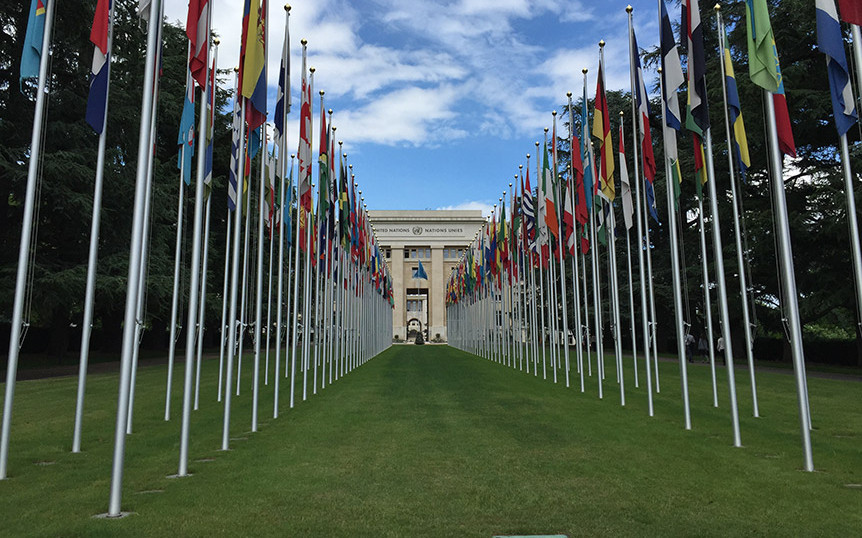From June through August 2018, United Nations (UN) Special Procedures sent five separate joint communications to the Kingdom of Saudi Arabia, expressing concerns over a myriad of human rights violations ranging from the targeting of women’s and human rights defenders, reprisals, the conflict in Yemen, arbitrary detention and more. This blog series highlights these joint communications and the Kingdom’s response, if they provided one.
On 14 June 2018, UN Special Procedures sent an Urgent Appeal (UA SAU 7/2018) from the Working Group on Arbitrary Detention; Working Group on Enforced or Involuntary Disappearances; Special Rapporteur on the promotion and protection of the right to freedom of opinion and expression; Special Rapporteur on the rights to freedom of peaceful assembly and of association; Special Rapporteur on the situation of human rights defenders; Special Rapporteur on extreme poverty and human rights; and Working Group on the issue of discrimination against women in law and in practice to the Kingdom of Saudi Arabia.
The communication from Special Procedures specifically raised concerns surrounding the arrest and charges, reprisals, and enforced disappearances of women’s rights defenders and other human rights advocates, including Loujain al-Hathloul, a leading figure in the women’s rights movement in Saudi Arabia and an advocate for the right to drive; Mohammed Saleh Al-Bajadi, co-founder of the Saudi Civil and Political Rights Association (ACPRA) and human rights defender; Aisha Al-Mana, Dean of Al-Mana College and a fundamental activist for women’s rights in the 1990s; and Eman Al-Nafjan, a blogger for a Saudi women’s blog and active supporter of the right to drive movement. Al-Hathloul and Al-Bajadi are high profile human rights defenders in the Kingdom, and this is not the first time their cases have attracted the attention of UN Special Procedures. In 2014, Al-Hathloul served as the focal point of another urgent appeal from Special Procedures, notably for her arrest after driving her car into Saudi Arabia before the lift of the driving ban. Meanwhile, Al-Bajadi was the subject of two previous joint urgent actions and an Opinion issued by the Working Group on Arbitrary Detention in 2015, which officially deemed his continued detention arbitrary.
Al-Hathloul, Al-Mana, and Al-Nafjan have all been very vocal advocates for women’s rights and serious proponents of lifting the driving ban. However, all three women were detained by the authorities just weeks before the lift of the driving ban was promulgated, along with 10 other activists who had been advocates for a woman’s right to drive. Special Procedures found great concern in the fact that Al-Hathloul had been held incommunicado since her arrest and a press outlet reported charges brought against her and Al-Nafjan, including charges of “suspicious communication with foreign entities recruiting people working in government positions and funding hostile groups to undermine Saudi national security, stability and social peace and to destroy social cohesion.” Just a week later, Al-Bajadi was arrested in his home by officers form the State Security Intelligence without showing a warrant for his arrest nor informing him of the reason for his arrest. His arrest came at the same time the government targeted more than 10 other human rights defenders.
The Special Procedures offices expressed serious concern over the crackdown on women’s rights defenders and other human rights defenders, reiterating findings from the March 2018 Committee on the Elimination of Discrimination against Women report for Saudi Arabia that recommended Saudi Arabia refrain from instituting reprisal and criminalizing free expression. However, Saudi Arabia ultimately failed to implement these recommendations by executing a clear and targeted attempt to silence female dissidents and activists, causing the mandates to express serious concern for the state of free expression and even the location of those detained.
To address these concerns, Special Procedures requested several points of clarification on these cases from the Saudi government, including information on access to legal counsel for the accused or contact with their families, specific charges for each individual and how they adhere to international human rights standards, and arrest procedures for those arrested during the May to June wave of arrests of human rights defenders. The mandates additionally requested that the Kingdom provide information on current measures taken to ensure the safety of human rights defenders.
However, despite this request and even a public statement condemning the arrest of these defenders, the Saudi government ultimately failed to respond to the communication, making it clear where female activists and women’s rights defenders lie in Saudi priorities. Instead, Al-Hathloul remains in detention alongside Eman Al-Nafjan and Al-Bajadi. Al-Mana has since been released. To make matters worse, human rights defender Israa Al-Ghomgham faces the death penalty and, if the recommended sentence is enforced, will be the first woman in Saudi Arabia to be executed for charges pertaining to peaceful activism. Since Saudi Arabia has ignored this Special Procedures appeal, the situation for women’s rights defenders has become increasingly dire and lives remain on the line as the Kingdom refuses constructive interaction with UN mechanisms.
Laura Neumayer is an Advocacy Fellow with ADHRB.





